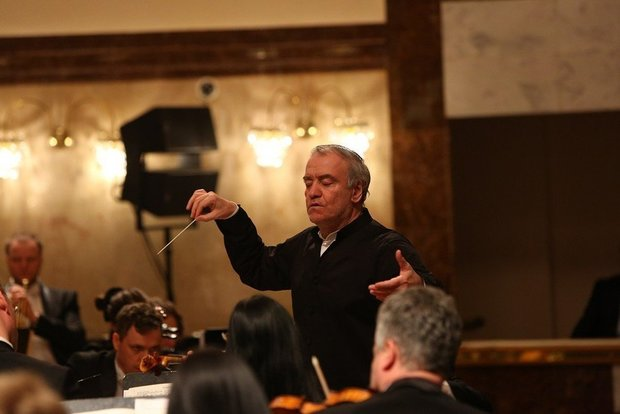Maestro Gergiyev pays tribute to Prokofiev in Kazan
An Easter festival visited the Tatarstan capital again
Big guests were on the Kazan stage again. The Symphony Orchestra of the Mariinsky Theatre conducted by Valery Gergiyev performed last Friday in the Tatarstan State Big Concert Hall. The maestro gave two concerts within the 20th jubilee edition of the Moscow Easter Festival. The concert programme was dedicated to Sergey Prokofiev — the whole music world celebrated his 125th jubilee on 23 April.
“Futuristic concert”
The concert became a tribute to outstanding Russian composer Sergey Prokofiev whose 125th birthday was celebrated on 23 April. It is no surprise that maestro Valery Gergiyev chose precisely this theme because Mr Prokofiev’s music played in the Mariinsky Theatre for the first time more than a hundred years ago. In 1916, the premiere of his Scythian Suite was on the stage of the Petersburg theatre. The composer himself conducted the orchestra then. While in 1991, in honour of Prokofyev’s 100th birthday, the Mariinsky Theatre hosted the premieres of his three operas at once: The Gambler, The Fiery Angel and The Love for Three Oranges.
While Piano Concerto No. 2 in G minor with amazing power and force of characters’ influence sounded on the Kazan stage. The composition includes both deep lyricism and romantic frenzy. The main role here is given to the gorgeous piano part by Daniil Trifonov, the orchestra is like some background for it.
The premiere of Concerto No. 2 took place in the summer of 1913. We should say that the first performance ended with a big scandal. Critics named Prokoviev “a piano cubist and futurist”. Though there were rare prising comments too. For instance, famous Soviet music critic Boris Astafiev assessed the concert as “an amazing composition bewildering with its sincerity and new expression”. Composer Vyacheslav Karatygin considered the concert as one of the greatest achievements of Russian music.
The manuscript of the score was lost soon after its creation. However, it became possible to save the part of the piano. And the composer orchestrated the composition again in 1923.
Pianist who arrived at the last minute
The performance of a Russian pianist, laureate of Russian and international music contests Daniil Trifonov became a real gift for the audience — he performed the solo in Concerto No.2. The 30-year-old musician who is named great Franz Liszt’s heir is considered one of the most outstanding pianists of his generation. A day earlier, the participation of Trifonov in the concert was under question — the musician had been on a tour in Yaroslavl. Nevertheless, he arrived in Kazan and had the time to join the performance.
Trifonov’s interpreting technique is famous for its lightness and accuracy. Knitting music lace, he seemed to give listeners invisible wings. By the way, he played without the score as if he was getting music from the air.
Посмотреть эту публикацию в Instagram
The audience was conquered both by the virtuoso pianist and the mastery of the Mariinsky musicians. There was amazement, the shouts “Bravo!” and long ovation.
“Greatness of human morale”
Then Symphony No. 5 in B-flat major played in the Big Concert Hall. It doesn’t contain any stylisation, parallel with stage compositions. It is monumental with a grandiose scale in which heroic and epic motifs are clearly heard. It is quite in line with the tragic spirit of those times: the country almost won the great war, but more than a year was ahead.
Prokofiev himself wrote about his work: “I composed it as a symphony of the greatness of human morale”. Again, he conducted the orchestra when this composition was performed for the first time — it was a terrible but victorious winter of 1945. By the way, it was the last time Prokofiev conducted. While Svyatoslav Richter who heard the symphony wrote about the author: “In Symphony No. 5, he stands up to his genius”.
For this composition, Mr Prokofiev received the Stalin Award in 1946. The Mariinsky Symphony Orchestra gladdened the audience with the famous Masks from Romeo and Juliet ballet by Prokofiev and an overture to Johann Strauss’s Die Fledermaus operetta. Trifonov played separately too — he performed two compositions.

Russia’s largest music forum
The Moscow Easter Festival is Russia’s largest music forum annually gathering hundreds of thousands of listeners. The project appeared in 2002 on Valery Gergiyev and the Moscow government’s initiative. In 2003, it became a Russian festival with the support of Russian President Vladimir Putin. The project has four parts — symphony, chamber music, choir and bell-ringing. In the last 19 years, several thousands of artists have participated in it — both renowned performers and young laureates of the International Tchaikovsky Competition.
Today festival concerts take place in 145 cities of five countries. An open concert of the Symphony Orchestra of the Mariinsky Theatre on Victory Day at Poklonnaya Mount in Moscow is traditionally the apotheosis of the event.